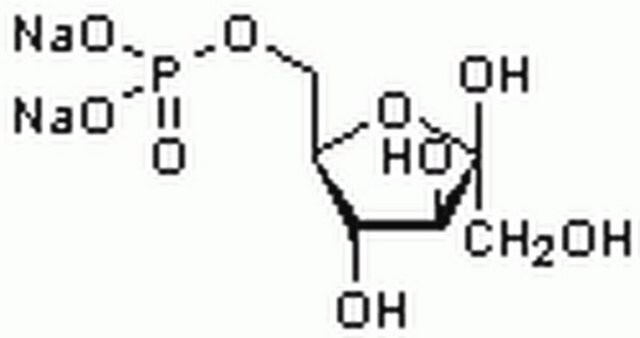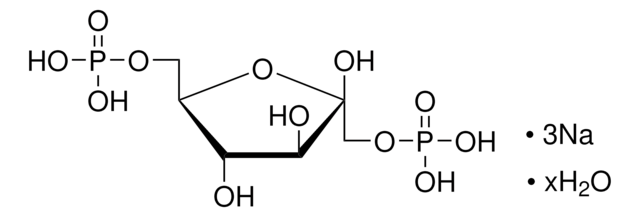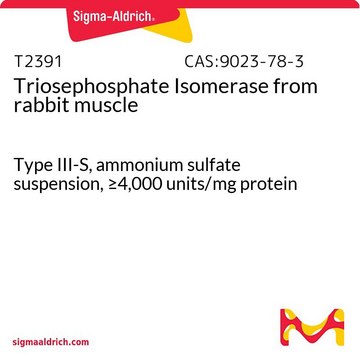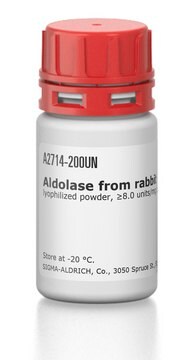F0137
Fructose-6-phosphate Kinase from Bacillus stearothermophilus
Type VII, lyophilized powder, ≥50 units/mg protein
Sinónimos:
6-Phosphofructokinase, ATP:D-fructose 6-phosphate 1-phosphotransferase
Iniciar sesiónpara Ver la Fijación de precios por contrato y de la organización
About This Item
Productos recomendados
type
Type VII
form
lyophilized powder
specific activity
≥50 units/mg protein
mol wt
34 kDa
shipped in
wet ice
storage temp.
−20°C
General description
Fructose-6-phosphate kinase from Bacillus stearothermophilus, a 34 kDa enzyme, belongs to phosphofructokinase (PFK) - like superfamily. The glutamate 161 and arginine 162 residues at the active site are crucial for substrate binding.
Research Area: Cell Signaling
Bacillus stearothermophilus phosphofructokinase (BsPFK) is a homotetramer that is allosterically inhibited by phosphoenolpyruvate (PEP), which binds along one dimer-dimer interface.
Bacillus stearothermophilus phosphofructokinase (BsPFK) is a homotetramer that is allosterically inhibited by phosphoenolpyruvate (PEP), which binds along one dimer-dimer interface.
Application
Fructose-6-phosphate Kinase from Bacillus stearothermophilus was shown to interact with neuronal nitric oxide synthase (nNOS) causing a defect in glycolytic metabolism and increased fatigability in dystrophic muscle.
Fructose-6-phosphate Kinase from Bacillus stearothermophilus has been used in the assay mixture for mass spectrometry assay for phosphoglucoisomerase (PGI) (G6P to F6P reaction).
Fructose-6-phosphate kinase from Bacillus stearothermophilus has been used:
- in steady state analysis of phosphofructokinase activity in the presence of ATP deuterated at the C8 position(C8-D ATP)
- for standard curve generation for quantifying muscle phosphofructokinase (PFK) activity
Biochem/physiol Actions
Fructose-1,6-bisphosphatase (FBP) is an important enzyme in glucose metabolism. It catalyzes the hydrolysis of fructose-1,6-bisphosphate to fructose-6-phosphate and inorganic phosphate. Fructose-6-phosphate kinase converts fructose-6-phosphate into fructose 1,6-bisphophate in the rate limiting step of the glycolysis cycle.
Phosphofructokinase (PFK) is an essential bifunctional enzyme that serves as a critical regulator in the intermediate stages of glycolysis. PFK is strongly linked to caveolae and is brought to caveolae by caveolin-1 in vascular smooth muscle cells (VSMCs).
Unit Definition
One unit will convert 1.0 μmole of fructose 6-phosphate and ATP to fructose 1,6-diphosphate and ADP per minute at pH 9.0 at 30 °C.
Physical form
Lyophilized powder containing buffer salt (e.g. phosphate buffer, or Tris buffer with NaCl)
Storage Class
11 - Combustible Solids
wgk_germany
WGK 3
flash_point_f
Not applicable
flash_point_c
Not applicable
ppe
Eyeshields, Gloves, type N95 (US)
Certificados de análisis (COA)
Busque Certificados de análisis (COA) introduciendo el número de lote del producto. Los números de lote se encuentran en la etiqueta del producto después de las palabras «Lot» o «Batch»
¿Ya tiene este producto?
Encuentre la documentación para los productos que ha comprado recientemente en la Biblioteca de documentos.
Los clientes también vieron
Loss of positive allosteric interactions between neuronal nitric oxide synthase and phosphofructokinase contributes to defects in glycolysis and increased fatigability in muscular dystrophy
Wehling-Henricks M, et al.
Human Molecular Genetics, 18(18), 3439-3451 (2009)
Rockann Mosser et al.
Biochemistry, 52(32), 5421-5429 (2013-07-19)
Bacillus stearothermophilus phosphofructokinase (BsPFK) is a homotetramer that is allosterically inhibited by phosphoenolpyruvate (PEP), which binds along one dimer-dimer interface. The substrate, fructose 6-phosphate (Fru-6-P), binds along the other dimer-dimer interface. Evans et al. observed that the structure with inhibitor
Analysis of the phosphofructokinase subunits and isoenzymes in human tissues
G.A. Dunaway et al.
The Biochemical Journal, 251, 755-757 (1988)
Chunsheng Liu et al.
American journal of physiology. Gastrointestinal and liver physiology, 307(7), G749-G759 (2014-08-30)
Platelet-derived growth factor (PDGF) and transforming growth factor-β (TGF-β) signaling are required for hepatic stellate cell (HSC) activation under pathological conditions such as liver metastatic tumor growth. These two signaling pathways are functionally divergent; PDGF signaling promotes proliferation and migration
M Hattori et al.
Nature, 405(6784), 311-319 (2000-06-01)
Chromosome 21 is the smallest human autosome. An extra copy of chromosome 21 causes Down syndrome, the most frequent genetic cause of significant mental retardation, which affects up to 1 in 700 live births. Several anonymous loci for monogenic disorders
Nuestro equipo de científicos tiene experiencia en todas las áreas de investigación: Ciencias de la vida, Ciencia de los materiales, Síntesis química, Cromatografía, Analítica y muchas otras.
Póngase en contacto con el Servicio técnico










